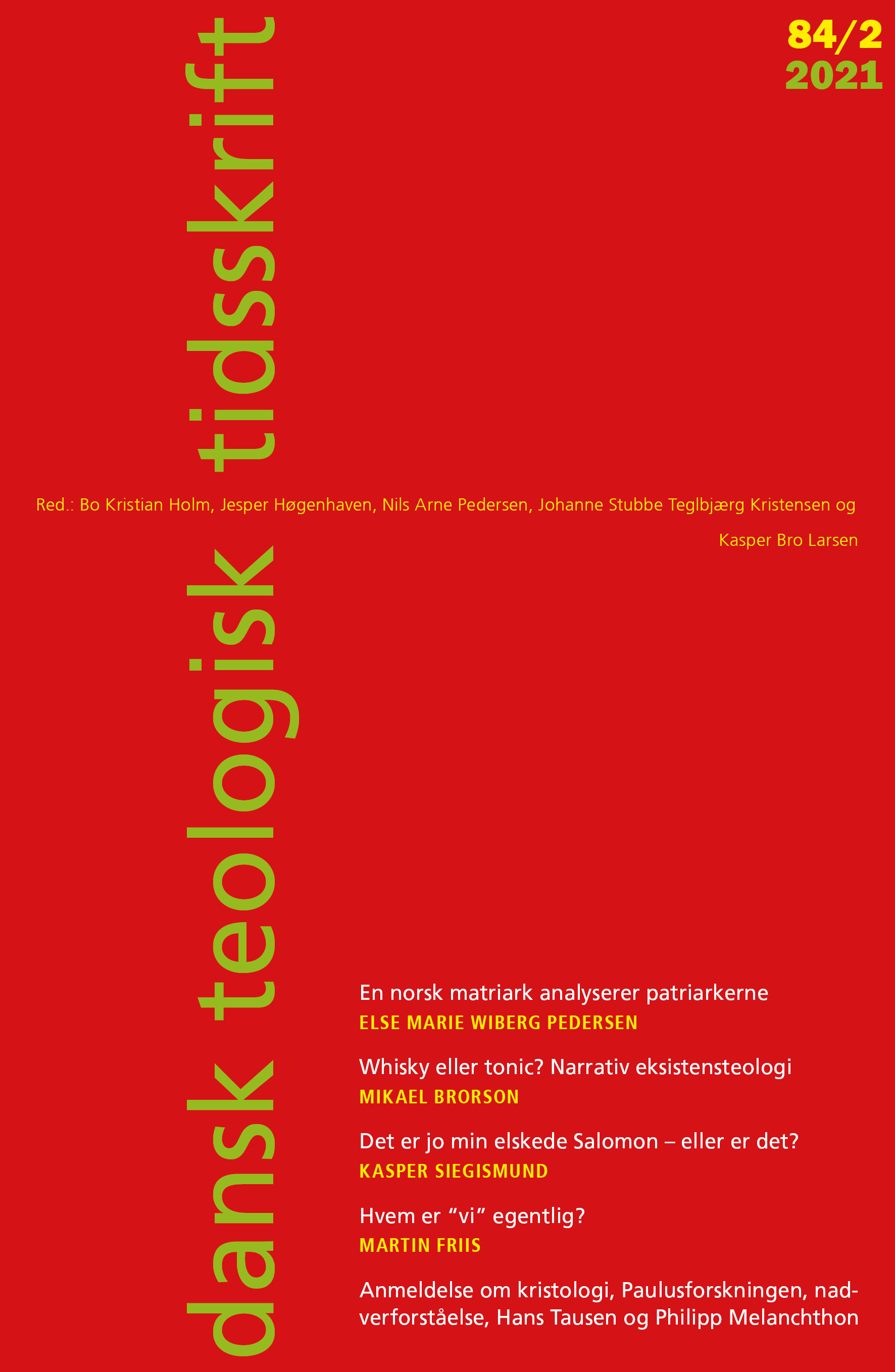Det er jo min elskede Salomon – eller er det?
Om Højsangen, fortolkning og Bibelen 2020
DOI:
https://doi.org/10.7146/dtt.v84i2.129660Keywords:
Song of Songs, Canticles, Bibelen 2020, Bible translation, Bible interpretation, Song of Songs as drama, translation and interpretationAbstract
The new Bible translation, Bibelen 2020, makes biblical books accessible to readers with little prior knowledge of the Bible, in idiomatic, contemporary Danish. However, the article argues that the attempt to make the texts accessible may have problematic consequences when the translation directly reflects one specific interpretation. This is particularly the case in the Song of Songs. Bibelen 2020 indicates the speaker of each passage, and the introduction identifies one female speaker (“Sulamit”) and one male (her beloved “Salomon”). In a very problematic way, this interpretation and the idea that the beloved is “Salomon”, referred to as “king”, have been built into the translation. The article discusses the once popular interpretation of the book as a drama including one woman and two men and argues that elements of such an approach can illuminate important aspects of the text. It is argued that these aspects are largely lost in the translation in Bibelen 2020.
References
Alexander, Philip S. 2009. “The Song of Songs as Historical Allegory: Notes on the Development of an Exegetical Tradition”. I Targumic and Cognate Studies: Essays in Honour of Martin McNamara, red. Kevin J. Cathcart & Michael Maher, 14-29. Sheffield: Sheffield Academic Press.
Baehrens, Wilhelm A. 1925. Origenes Werke. Achter Band: Homilien zu Samuel I, zum Hohelied und zu den Propheten, Kommentar zum Hohelied, in Rufins und Hieronymus’ Übersetzungen. Leipzig: J.C. Hinrichs’sche Buchhandlung.
Barbiero, Gianni. 2011. Song of Songs: A Close Reading. Overs. Michael Tait. Supplements to Vetus Testamentum 144. Leiden: Brill.
Bibelen 2020. København: Bibelselskabet 2020.
Bibelselskabet. 2019. “Spørgsmål og svar om Bibelen 2020”. Bibelselskabet d. 11. oktober 2019. https://www.bibelselskabet.dk/spoergsmaal-og-svar-om-bibelen-2020 (set 19.08.2021).
Buch-Hansen, Gitte. 2020. “Oplysning eller oplevelse. Synspunkter på Bibelen 2020”. TEOL-information 62: 9-13.
Bundvad, Mette. 2021. “Jeg elsker min have: Højsangen 4,12-5,1 og Prædikerens Bog 2,4-6 i et økoteologisk perspektiv”. I Gud og os – Teologiske læsninger af Det Gamle Testamente i det 21. århundrede, red. Jan Dietrich & Anne Katrine de Hemmer Gudme, 309-326. København: Bibelselskabet.
Driver, Samuel R. 1914. An Introduction to the Literature of the Old Testament (new edition, revised 1913). International Theological Library. New York: Charles Scribner’s Sons.
Elgvin, Torleif. 2018. The Literary Growth of the Song of Songs during the Hasmonean and Early-Herodian Periods. Contributions to Biblical Exegesis and Theology 89. Leuven: Peeters.
Ewald, Georg Heinrich August. 1826. Das Hohelied Salomos übersetzt mit Einleitung, Anmerkungen und einem Anhang über den Prediger. Göttingen: Deuerlich.
Heise, Victor. 1863. Sangenes sang, almindelig kaldet Salomos Højsang. København: Fr. Wøldikes Forlagsboghandel.
Herder, Johann Gottfried von. 1778. Lieder der Liebe: Die ältesten und schönsten aus Morgenlande. Nebst vierundvierzig alten Minneliedern. Leipzig: Weygandsche Buchhandlung.
Hopf, Matthias Rüdiger. 2017. “The Song of Songs as a Hebrew ‘Counterweight’ to Hellenistic Drama”. Journal of Ancient Judaism 8.2: 208-221.
Jacobi, Johann Friedrich. 1771. Das durch eine leichte und ungekünstelte Erklärung von seinen Vorwürfen gerettete Hohe Lied, nebst einem Beweise, dass selbiges für die Zeiten Salomons und seiner Nachfolger sehr lehrreich und heilsam und eines heiligen Dichters würdig gewesen.
Jones, Joseph R. 1983. “The ‘Song of Songs’ as a Drama in the Commentators from Origen to the Twelfth Century”. Comparative Drama 17.1: 17-39.
Larsen, Thomas Godsk. 2019. “Jeg kan godt se meningen med en sproglig opdatering”. Bibelselskabet d. 13. marts 2019. https://www.bibelselskabet.dk/jeg-kan-godt-se-meningen-med-en-sproglig-opdatering (set 11.09.2021).
Lundager Jensen, Hans Jørgen. 1989. “Salmas teltduge – eller Salomos?”. I Skriv synet tydeligt på tavler! Om problemerne ved en ny bibeloversættelse, red. Knud Jeppesen & John Strange, 27-34. København: G.E.C. Gad.
Mathews, H. J. 1874. Abraham Ibn Ezra’s Commentary on the Canticles, after the First Recension: Edited from Two Mss., with a Translation. London: Trübner.
Murphy, Roland E. 1990. The Song of Songs: A Commentary on the Book of Canticles or The Song of Songs. Hermeneia. Minneapolis: Fortress Press.
Nielsen, Kirsten. 2000. “Højsangen som religiøs tekst”. Bibliana 2.1: 7-17.
Nielsen, Kirsten, & Hans Jørgen Lundager Jensen. 1998. Ruths Bog, Esters Bog og Højsangen fortolket. København: Bibelselskabet.
Pope, Marvin H. 1977. Song of Songs: A New Translation with Introduction and Commentary. The Anchor Bible 7c. Garden City: Doubleday.
Qafih, Yosef. 1962. חמש מגילות. Jerusalem: האגודה להצלת גנזי תימן.
Stoklund Larsen, Birgitte. 2019. Når Bibelen oversættes. København: Bibelselskabet.
Strange, John. 1988. “Højsangen i gudstjeneste og forskning”. I Det gamle Testamente og den kristne fortolkning, red. Karin Friis Plum & Gert Hallbäck, 70-84. Forum for bibelsk eksegese 1. København: Museum Tusculanum.
Tov, Emanuel. 1995. “Three Manuscripts (Abbreviated Texts?) of Canticles from Qumran Cave 4”. Journal of Jewish Studies 46: 88-111.
Verdeyen, Paul. 2011. Vita prima Sancti Bernardi Claraevallis abbatis. Corpus Christianorum Continuatio Mediaevalis 89B (Guillelmi a Sancto Theodorico opera omnia pars VI). Turnhout: Brepols.
Øland, Lisbeth Elkjær, red. 2019. Sange til kærligheden. København: Bibelselskabet.





